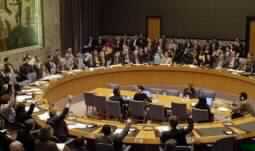HIGHLIGHTS: Vote Victory to Washington with Backing From Russia, Saddam's Most Powerful Ally||A New Harassment to the Iraqi People, Iraqi UN Ambassador|| Council Experts Reject A Series of Syrian Amendments to Resolution||STORY: The U.N. Security Council unanimously approved an overhaul of sanctions against Iraq on Tuesday in a bid to tighten the 11-year-old military embargo on Saddam Hussein's regime while easing the flow of civilian goods into the Arab Gulf nation. The 15-0 vote was a victory for the United States with backing from Russia, Saddam's most important council ally. (Read photo caption)
The overhaul extends the U.N. oil-for-food program for six months and represents the biggest change since the humanitarian program was launched in 1996 to help Iraq's people cope with sanctions imposed after Saddam's 1990 invasion of Kuwait.
The newly adopted resolution contains a lengthy list of goods that would need U.N. review before shipment to Iraq, ranging from telecommunications and information technology equipment to sophisticated engineering items. But all other humanitarian goods can be freely imported by Iraq.
Under the program's current operation, the U.N. committee monitoring sanctions must approve most contracts for humanitarian goods. But any of the 15 Security Council members can place a contract on hold.
More than 5 billion US dollar worth of contracts are currently on hold - about 90 percent by the United States and about 10 percent by Britain - on grounds that the goods have a potential military use. Iraq has criticized the Western allies for denying it crucial humanitarian supplies.
The vote capped months of negotiations between Russia, which wants sanctions against Iraq suspended, and the United States, which is committed to removing Saddam Hussein and has threatened to use force if he doesn't allow U.N. weapons inspectors to return.
Russia's U.N. Ambassador Sergey Lavrov agreed that it would make it easier to import humanitarian goods, but said, "It is only through the lifting of the sanctions that Iraq can rebuild its economy."
Iraq's U.N. Ambassador Mohammad Al-Douri said the new goods review list "will prevent any development of the Iraqi economy for the future" by blocking the import of agricultural, electrical and sanitation equipment.
"This is a new harassment on the Iraqi people," he said.
Al-Douri said his government was "unhappy" with any resolution that didn't lift sanctions.
Sanctions against Iraq cannot be lifted until U.N. inspectors report that its biological, chemical and nuclear weapons programs have been dismantled along with the missiles to deliver them. Inspectors left Iraq ahead of U.S. and British air strikes in December 1998 and Iraq has barred them from returning, maintaining that its banned weapons programs have been eliminated.
Since March, Iraq's Foreign Minister Naji Sabri has held two rounds of talks with U.N. Secretary-General Kofi Annan on the return of inspectors, and a third round is expected, probably in late May.
The vote was delayed by 24 hours to give Syria time to consult its government after council experts rejected a series of Syrian amendments to the resolution.
PHOTO CAPTION
The United Nations Security Council unanimously approved 15-0 an overhaul of sanctions against Iraq in a victory for the United States with backing from Russia, Saddam Hussein's most important council ally at the United Nations headquarters in New York Tuesday, May 14, 2002 (AP Photo/Osamu Honda)
- Author:
& News Agencies - Section:
WORLD HEADLINES


 Home
Home Discover Islam
Discover Islam Quran Recitations
Quran Recitations Lectures
Lectures
 Fatwa
Fatwa Articles
Articles Fiqh
Fiqh E-Books
E-Books Boys & Girls
Boys & Girls  Women
Women










